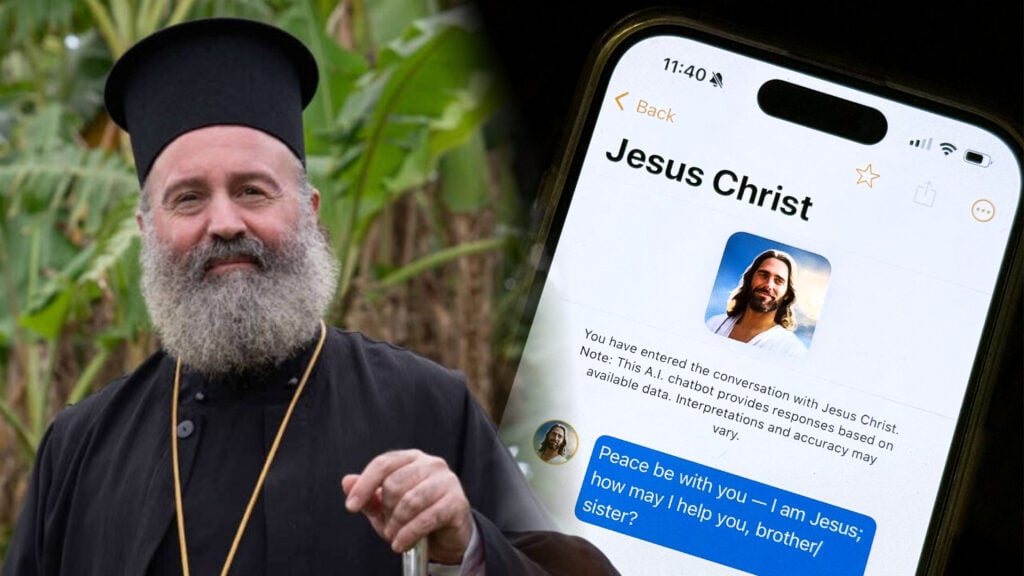Artificial intelligence, the technology upending nearly every corner of society, is creeping into religion, serving up virtual Jesus and automated sermons – a change drawing mixed reviews from the faithful.
Religious chatbots and other faith-based digital tools are growing in number, offering counsel, comfort and spiritual guidance during an age of rapidly transforming socialization and engagement.
One app, which is called Text with Jesus, has thousands of paying subscribers. It lets people ostensibly ask questions of Mary, Joseph, Jesus and nearly all 12 apostles.
The idea is to educate, said Stephane Peter, CEO of Catloaf Software, which created the app.
“This is a new way to address religious issues in an interactive way,” he told AFP.
Although the app makes clear it uses AI, virtual Moses and Jesus don’t recognise that as such when asked the specific question.
Peter said that ChatGPT’s latest version, GPT-5, on which Text With Jesus is based, follows instructions better than previous iterations. It is also better at staying in whatever character it is supposed to be and can deny more forcefully that it’s a bot.
He said many people consider the app blasphemous but it still has received a good rating in the App Store – 4.7 out of 5.
Online ministry Catholic Answers said it got a taste of how sensitive all this can be when it launched the animated AI character “Father Justin” last year.
“A lot of people were offended that it was using a priest character,” said Christopher Costello, the ministry’s director of information technology.
Days later, Catholic Answers stripped the avatar of its title to make it simply Justin.
“We don’t want to replace humans. We just want to help,” Costello said.
No ‘heart and spirit’
Other major religions have similar apps, such as Deen Buddy for Islam, Vedas AI for Hinduism, and AI Buddha. Most bill themselves as interfaces with scripture, not incarnations of actual holiness.
Nica, a 28-year-old Filipina who belongs to the Anglican Church, said she uses ChatGPT almost daily to study scripture – even though her pastor wants her to stop.
She said “sometimes I have random thoughts about the Bible and I want answers immediately”.
Not many will acknowledge using AI assistants in matters of religion, even though some of these apps have been downloaded millions of times.
“People who want to believe in God maybe shouldn’t ask a chatbot. They should talk to people that believe, too,” said a woman named Emanuela as she left St Patrick’s Cathedral in New York.
Rabbi Gilah Langner said the halakhah – the collective body of religious laws derived from the Torah, the Jewish holy book – has many interpretations. Jews need other Jews, with their insights and perspective, to connect them to the tradition of their faith, she said.
“I don’t think you really get that from AI. It’s possible it would be very nuanced, but the emotional connection is missing,” Langner told AFP.
AI can make people feel “isolated and not in an organic connection to a living tradition,” she added.
For their part, Christian communities do not reject AI outright.
Last year Pope Francis named Cypriot Brit Demis Hassabis, a co-founder of AI research lab Google DeepMind, to serve in the Vatican’s scientific academy.
Peter said he had spoken to clergy members and they agreed that AI could be a tool to educate people.
But not all are convinced
In a video address on the topic of AI, sent to Neos Kosmos, Archbishop Makarios of the Greek Orthodox Church of Australia said that while many talk about AI’s potential to “improve teaching methods, personalise learning and automate assessment,” serious ethical and spiritual questions remain.
“However, there are some concerns raised as well,” he said, pointing to the privacy of students and teachers and the fear that educators could one day be replaced by machines.
“How will the Church position itself regarding the ‘gifts’ that Artificial Intelligence offers to our young students? Especially for those who serve in the Diaspora and are responsible for the operation of the Greek day and evening schools,” he said.
“This challenge is particularly pressing. But sooner or later, we will be faced with the question of whether or not to adapt Artificial Intelligence applications in catechism schools or in Bible study groups, etc.”
The Archbishop questioned whether algorithms could ever be trusted to “manage, reproduce, and teach the Gospel and Patristic writings,” warning that technology is already deeply embedded in Church life.
“Unfortunately, services are conducted using tablets and iPads, and the psalteries are filled with mechanical ison assistants,” he said.
“These are just the beginning compared to what could come with Artificial Intelligence.”
In November 2023, pastor Jay Cooper of the Violet Crown City Church in Austin, Texas, had an AI assistant deliver an entire sermon. He warned parishioners in advance.
“Some people freaked out, said we are now an AI church,” said Cooper. But, he added, the service lured some people who did not usually attend church, especially video-game buffs.
Cooper said he has considered other ways of integrating AI into his church but has not repeated the AI sermon.
“I’m glad we did it,” he said, “but it missed the heart and spirit of what we usually do.”
Citing a similar example of a church in Bavaria that used a robot to conduct worship, Archbishop Makarios asked: “Could a sacred service be conducted by a robot or an avatar instead of a priest? Could Artificial Intelligence be entrusted with preaching the divine word… to replace our chanters?”
He noted that some clergy already rely on AI to help compose sermons, but stressed that “it is self-evident that all aforementioned scenarios are categorically rejected by the Orthodox Church.”
Even if AI could replicate certain human tasks safely, he added, “scepticism cannot dissipate.”
With AFP








